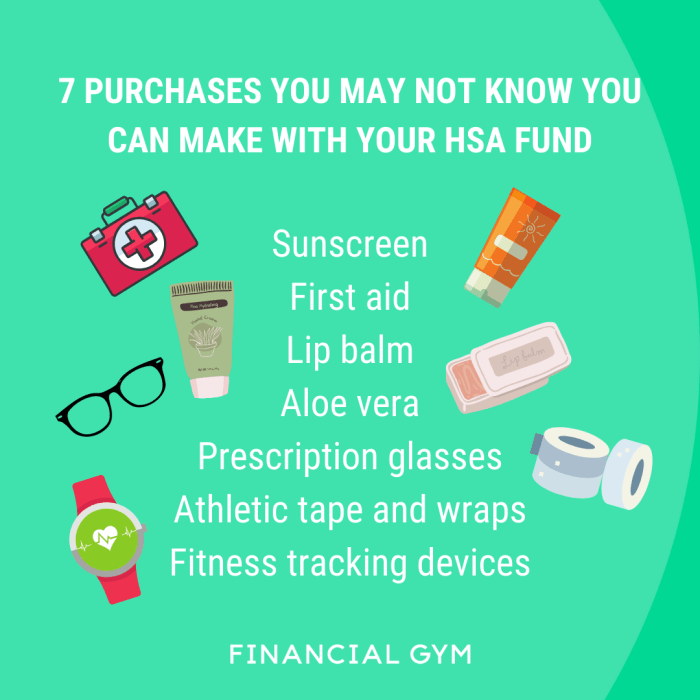Navigating the complexities of health savings accounts (HSAs) can feel like deciphering a medical textbook. One common question revolves around the use of HSA funds for health insurance premiums: can you directly apply your HSA savings to cover these costs? This guide will explore the intricacies of HSA regulations, eligibility requirements, and the permissible uses of your HSA funds, providing clarity on this often-misunderstood aspect of healthcare financing.
Understanding HSA rules is crucial for maximizing your healthcare savings. This involves not only knowing which plans qualify for HSA contributions but also comprehending the tax implications associated with different withdrawal scenarios. We will delve into the specifics, clarifying the permitted and prohibited uses of your HSA funds, and illuminating the potential tax advantages and disadvantages associated with various approaches.
HSA Eligibility and Regulations
Health Savings Accounts (HSAs) offer a tax-advantaged way to save for qualified medical expenses, but eligibility is carefully defined by the IRS. Understanding these rules is crucial for maximizing the benefits of an HSA. This section will clarify the requirements for HSA eligibility, contribution limits, and withdrawal regulations, highlighting key differences in state-level regulations where applicable.
HSA Eligibility Requirements
To be eligible to open and contribute to an HSA, you must be enrolled in a high-deductible health plan (HDHP) that meets IRS guidelines. This means your HDHP must have a minimum deductible and maximum out-of-pocket expense limits as specified annually by the IRS. You cannot be covered by other health insurance (except for limited exceptions like a health plan solely for dental or vision care). You also cannot be claimed as a dependent on someone else’s tax return. Furthermore, you cannot be enrolled in Medicare.
IRS Regulations Concerning HSA Contributions and Withdrawals
The IRS dictates strict rules governing HSA contributions and withdrawals. Annual contribution limits exist, varying based on age and family status (see table below). Contributions made beyond these limits are subject to penalties. Withdrawals for qualified medical expenses are tax-free. However, withdrawals for non-qualified expenses are subject to income tax, plus a 20% additional tax penalty (unless you are age 65 or older). The IRS provides detailed guidance on what constitutes a qualified medical expense.
State-Level HSA Regulations
While federal regulations set the foundation for HSAs, states may have their own laws that influence the use of HSAs. For instance, some states may offer tax deductions or credits for HSA contributions, while others might have specific rules regarding how HSAs can be used within the state’s healthcare system. It’s essential to check your state’s regulations to ensure compliance. There’s generally not wide variation in state rules, however, as the IRS’s regulations are fairly comprehensive. The most significant state-level differences typically involve state tax benefits associated with HSA contributions or withdrawals.
HSA Contribution Limits
The following table summarizes the annual contribution limits for HSAs as of 2023. Remember that these limits are subject to change annually, so always refer to the most up-to-date IRS guidelines.
| Age Group | Individual | Family | Catch-Up Contribution (Age 55+) |
|---|---|---|---|
| Under 55 | $3,850 | $7,750 | $0 |
| 55 and Over | $3,850 | $7,750 | $1,000 |
HSA-Eligible Health Plans

To contribute to a Health Savings Account (HSA), you must be enrolled in a qualifying health insurance plan. This means your plan must meet specific requirements defined by the IRS. Understanding these requirements is crucial for maximizing the tax advantages associated with HSAs.
Only High-Deductible Health Plans (HDHPs) qualify for HSA contributions. These plans differ significantly from traditional health insurance plans in terms of their cost-sharing structure. The high deductible acts as a significant barrier before insurance coverage kicks in, encouraging individuals to be more mindful of healthcare costs.
High-Deductible Health Plan (HDHP) Characteristics
HDHPs are characterized by their high deductibles, out-of-pocket maximums, and relatively low monthly premiums. The high deductible means you’ll pay more out-of-pocket for medical expenses before your insurance coverage begins. However, the lower premiums make them attractive to healthy individuals or those who anticipate few medical expenses in a given year. The out-of-pocket maximum sets a limit on the total amount you’ll pay for covered medical expenses in a year. Once this limit is reached, your insurance plan covers 100% of covered expenses for the remainder of the year.
Minimum Deductible Requirements for HSA Eligibility
The minimum deductible for an HDHP varies annually and is set by the IRS. To be eligible for an HSA, your HDHP must meet or exceed the minimum deductible amount specified by the IRS for your coverage level (self-only, family). This ensures that the HDHP truly reflects a high-deductible plan and isn’t simply a lower-cost traditional plan disguised as an HDHP. For example, if the IRS minimum deductible for self-only coverage in a given year is $1,500, your HDHP’s deductible must be at least $1,500 to qualify for HSA contributions. Similarly, there are minimum out-of-pocket maximum requirements that must also be met.
Determining HSA Eligibility Based on Health Plan Features
The following flowchart illustrates the process of determining HSA eligibility based on your health plan features. It highlights the key criteria and decision points involved in the process.
Flowchart: Determining HSA Eligibility
Start –> Is your health plan a High-Deductible Health Plan (HDHP)? –> Yes –> Does your HDHP meet the IRS minimum deductible and out-of-pocket maximum requirements for the plan year? –> Yes –> HSA Eligible –> End
No (from “Is your health plan a High-Deductible Health Plan (HDHP)?”) –> Not HSA Eligible –> End
No (from “Does your HDHP meet the IRS minimum deductible and out-of-pocket maximum requirements for the plan year?”) –> Not HSA Eligible –> End
Using HSA Funds for Premiums

Using a Health Savings Account (HSA) offers significant tax advantages for healthcare expenses. While HSAs are primarily associated with paying for medical expenses directly, a key question often arises: can HSA funds be used to pay health insurance premiums? The answer is nuanced and depends on the specific circumstances.
The ability to use HSA funds for health insurance premiums is largely determined by the type of health insurance plan you have. Generally, HSA funds cannot be used to pay premiums for traditional health insurance plans. However, they can often be used to pay premiums for certain types of health insurance plans, such as those offered through a qualified health savings account (HSA) compatible high-deductible health plan (HDHP). The implications of using HSA funds for premiums versus other medical expenses relate primarily to timing and tax efficiency.
HSA Premium Payment Eligibility
Using HSA funds for premiums, when permissible, offers the same tax advantages as using them for other qualified medical expenses. Contributions to an HSA are made pre-tax, the money grows tax-free, and withdrawals for qualified medical expenses are tax-free. Therefore, paying premiums with HSA funds avoids paying taxes on that portion of your premium. In contrast, if you pay premiums with after-tax dollars, you receive no tax benefit. The tax advantage is amplified by the fact that the money grows tax-free within the HSA, further increasing the overall savings. Consider a scenario where an individual pays $1000 in premiums annually. If paid with after-tax dollars, the full $1000 is an expense. If paid with HSA funds, the $1000 is tax-free and the initial HSA contribution also received a tax deduction.
Permitted and Prohibited HSA Expenses
Understanding what expenses qualify for HSA reimbursement is crucial for maximizing the benefits of the account. The following list Artikels common permitted and prohibited uses of HSA funds:
The IRS provides a comprehensive list of qualified medical expenses, but here’s a summary to illustrate the key distinctions:
- Permitted Expenses: Doctor visits, hospital stays, prescription drugs, dental and vision care (often subject to plan limitations), medical equipment (e.g., crutches, diabetic supplies), and certain over-the-counter medications. In many cases, premiums for HSA-eligible high-deductible health plans are also permitted.
- Prohibited Expenses: Cosmetic surgery (unless medically necessary), weight loss programs (unless medically supervised for a specific condition), vitamins and supplements (unless prescribed by a doctor), and most health insurance premiums for plans not specifically designed to be used with an HSA. Generally, non-medical expenses are not permitted.
Tax Implications and Penalties

Understanding the tax implications of using your Health Savings Account (HSA) is crucial for maximizing its benefits. Improper withdrawals can lead to significant tax burdens and penalties. This section details the tax consequences associated with various HSA withdrawal scenarios, emphasizing the differences between using HSA funds for qualified medical expenses and non-qualified expenses, including health insurance premiums where permitted.
Tax Consequences of Non-Qualified Withdrawals
Withdrawing HSA funds for non-qualified medical expenses results in double taxation. First, the withdrawn amount is taxed as ordinary income. Second, you may also be subject to a 20% additional tax penalty unless you are at least age 65 or meet specific exceptions. For example, if you withdraw $1,000 for a non-qualified expense, you’ll pay income tax on that $1,000, plus an additional $200 penalty (if applicable). This significantly reduces the overall savings compared to using HSA funds for eligible medical expenses.
Tax Implications: Premiums vs. Other Medical Expenses
Using HSA funds for health insurance premiums (if your plan allows) is generally treated as a qualified medical expense, avoiding the double taxation and penalty. However, it’s essential to confirm your plan’s eligibility criteria. Contrast this with using HSA funds for other medical expenses like doctor visits or prescription drugs, which are also tax-free when used for qualified medical purposes.
For instance, let’s compare two scenarios:
Scenario 1: You use $500 from your HSA to pay your health insurance premium (a qualified expense). No tax is owed.
Scenario 2: You use $500 from your HSA to purchase a new television (a non-qualified expense). You will owe income tax on the $500, plus a 20% penalty ($100) if under 65 and not meeting any exception.
Potential Penalties for Incorrect HSA Use
Incorrect use of HSA funds can lead to significant penalties. Beyond the 20% penalty for non-qualified withdrawals (under age 65 and not meeting an exception), additional penalties may apply depending on the nature of the violation and IRS regulations. These penalties can be substantial and significantly impact your overall HSA savings. It is always advisable to consult a tax professional for guidance on specific situations.
Tax Implications Summary Table
| Withdrawal Scenario | Tax on Withdrawal | Additional Penalty (Under 65, unless exception applies) | Example |
|---|---|---|---|
| Qualified Medical Expense (e.g., Doctor’s Visit) | None | None | $1000 withdrawn for doctor visit: $0 tax, $0 penalty |
| Qualified Medical Expense (e.g., Health Insurance Premium – if allowed) | None | None | $500 withdrawn for health insurance: $0 tax, $0 penalty |
| Non-Qualified Expense (e.g., Vacation) | Taxed as ordinary income | 20% of withdrawal amount | $500 withdrawn for vacation: $500 taxed as income, $100 penalty |
| Non-Qualified Expense (e.g., Personal Item) | Taxed as ordinary income | 20% of withdrawal amount | $1000 withdrawn for personal item: $1000 taxed as income, $200 penalty |
Wrap-Up
Ultimately, the question of whether you can use an HSA to pay health insurance premiums hinges on a nuanced understanding of IRS regulations and the specific features of your health plan. While direct payment of premiums isn’t typically allowed, strategic utilization of HSA funds for other eligible medical expenses offers significant tax advantages. By carefully considering your options and understanding the implications of each decision, you can optimize your HSA to effectively manage healthcare costs and maximize your financial well-being.
Key Questions Answered
Can I use my HSA to pay for my spouse’s or child’s health insurance premiums?
No, HSA funds cannot be used to pay for premiums for dependents, only for your own coverage under a qualified HDHP.
What happens if I use HSA funds for non-medical expenses?
Using HSA funds for non-qualified expenses will result in income tax, plus a 20% additional tax penalty on the withdrawn amount (unless you are age 65 or older).
Are there any circumstances where I can use my HSA for premiums?
While direct payment is generally prohibited, some very specific, rare situations might allow for indirect use, such as reimbursement for a co-pay on a health insurance premium.
Can I withdraw money from my HSA tax-free to pay for a qualified medical expense even if I don’t have an HDHP anymore?
Yes, as long as the expense was incurred while you had an HSA-qualified HDHP. The funds remain tax-advantaged even after the HDHP is no longer in effect.